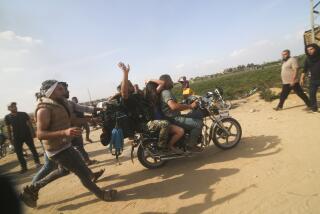Global Trampling of Human Rights Seen : Suppression: Amnesty International’s report details efforts to quell ethnic and nationalist groups.
- Share via
LONDON — Using torture, murder and mass arrests, governments trampled the human rights of tens of thousands of people in 1989 to suppress conflicts stemming from ethnic or nationalist tensions, Amnesty International said Tuesday.
Despite democratic revolutions in Eastern Europe, reform in South Africa and signs of change in some black African countries, the group’s annual world survey of human rights painted a grim picture in a report to be released today.
Cases cited in the 138-country report ranged from children tortured in Iraq to a Spaniard sentenced for burning the flag; from alleged racial bias in American capital punishment to the jailing of Malawi’s only neurosurgeon for criticizing the president; from death squads in El Salvador to draft refusers in Western Europe.
The theme of this year’s report is “the suppression of ethnic and nationalist groups,” which Amnesty International said has often “served to entrench bitter conflicts, dimmed prospects for dialogue and added to the toll of suffering and death.”
The survey saw this pattern in countries including Somalia, Ethiopia, Sudan, Sri Lanka, India, Indonesia, Myanmar, the Soviet Union, Yugoslavia, China, Chad, Mauritania, Israel, Iran, Iraq, Turkey, Bulgaria, Guatemala and Brazil.
“Around the world, particularly where the tensions erupted into violence, tens of thousands of people became victims of security operations resulting in ‘disappearances’ and extrajudicial executions,” the report said.
“The conflicts ranged from local disputes over the cultural rights of distinctive ethnic groups through to full-scale confrontation over demands for autonomy or secession,” it said.
The demands were often non-violent, but in many instances, violent attacks or armed insurgency were dominant features, the report said.
Amnesty International said it recognized that governments faced complex situations and, in some cases, armed groups that kidnaped, tortured and murdered opponents.
But it said, “None of these factors can ever justify or excuse a government violating the basic human rights of any of its citizens or those over whom it exercises control.”
It said police and military forces in several Western Hemisphere nations dramatically increased their attacks on political opponents in 1989.
In Eastern Europe, it said, new governments have emptied their prisons of dissidents, but it said dissenters are still harshly treated in Albania, Bulgaria and Yugoslavia.
In the Middle East and North Africa, it said, killings, mass arrests and torture of political opponents continued, but there were also some signs of improvement.
Governments in Asia have resorted to mass killings, torture, detentions and unfair trials to repress mass opposition movements, the report said.
“Prisoners of conscience in Asia ranged from a Buddhist monk in Vietnam to a 52-year-old doctor in Indonesia,” it said.
At least 1,000 people were killed and thousands were wounded when troops fired on crowds of unarmed protesters and bystanders in Beijing in June, 1989, to suppress pro-democracy demonstrations, the report said, adding that “an atmosphere of terror” prevented any accurate count of deaths.
Only a few dozen executions in connection with the protests were reported publicly, but unofficial sources estimated that several hundred people were executed secretly in China after June 4, 1989, the report said.
On a positive note, Amnesty International noted the release of political prisoners in Benin, Ethiopia, Somalia, South Africa and Namibia, and reductions in executions in South Africa and Nigeria.
More to Read
Sign up for Essential California
The most important California stories and recommendations in your inbox every morning.
You may occasionally receive promotional content from the Los Angeles Times.










